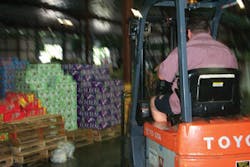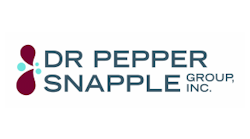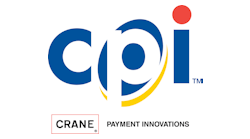As the greater Washington, D.C. economy expands further into neighboring areas, a new regional vending player has emerged in the West Virginia/Virginia region, aided largely by state-of-the-art vending management software.
In just four years, Sure Bet Services, the full line vending division of an established cold beverage bottling company, has become a leading player in a fast growing region. The double digit annual growth for the Ranson, W.Va.-based company has been largely facilitated by the implementation of DEX handheld computers.
Sure Bet Services has become a major player in educational, government, health care and business and industry accounts. It is the first independent vending operation to win some major government accounts that the nationals and big name beverage bottlers have historically dominated.
Sure Bet Services was launched four years ago by Royal Crown Bottling Co., based in Winchester, Va. Brothers Scott and W.E. Bridgeforth, third generation owners, recognized the need for a dedicated focus on vending. Like many cold beverage bottlers, the company operated vending machines for many years in addition to supplying beverages to third party vendors.
Need for a Dedicated Vending Focus
Scott Bridgeforth said that the need for a dedicated full-line vending organization became obvious a few years ago. Until that time, the company’s vending machines were serviced by its direct store delivery (DSD) trucks, the same trucks that delivered case loads of beverages to retailers and foodservice establishments.
As the retail outlets had grown in size over the years, the vending machines became more of a distraction to Royal Crown Bottling Co.’s DSD drivers. These drivers were paid partly on commission, and the vending machines were small volume compared to the retail super stores. As a result, many of the vending machines did not get proper attention.
“Their (drivers’) focus was being lost on vending machines,” Scott Bridgeforth said.
As bottlers, the Bridgeforths were aware of the fact that vending is a viable business. But as observers of successful vending operations, they also recognized that vending requires a dedicated focus to be successful. They decided it was necessary to develop a dedicated vending organization.
In 2003, the brothers hired a sales manager and a driver to focus full time on vending. Around this time, the company also opened a warehouse in Charles Town, W.Va. to expand its bottling operation into the West Virginia market.
Meanwhile, Scott Bridgeforth got to know Rodney Moore, a business development manager for one of the major vending equipment manufacturing companies. Moore struck Bridgeforth as very knowledgeable about vending. Moore was also someone who had contacts in West Virginia, a market that the Bridgeforths wanted to develop.
Scott Bridgeforth reasoned that Moore, given his vending background, could build Sure Bet Services into a larger company.
Acquisition Jumpstarts the Vending Business
At the time, Sure Bet Services only had a few customers. After talking with Moore and reaching an agreement, the Bridgeforths decided to purchase an existing vending company in the West Virginia Eastern Panhandle and hire Moore to develop and run the business.
Moore, for his part, welcomed the opportunity to build Sure Bet Services. Having worked as a business development manager for an equipment manufacturer, he was aware of the capabilities of new machines. He also had extensive operational knowledge, having worked with vending operators and bottlers nationwide.
“I felt confident in the ability to take advantage of the knowledge I’d gained with my past experience working directly with operators and bottlers in the industry. I would apply that to this business, picking out the good methods and not using the bad,” Moore said.
Owners to Invest in the Business
What convinced Moore to come on board was the Bridgeforth brothers’ honesty and integrity in how they run and operate a business, along with their longevity and success in the industry. From talking with them, Moore realized the brothers understood that vending is a capital-intensive business and state-of-the-art equipment is needed to provide the best possible service.
Moore also knew that Sure Bet Services would not be tied to any particular beverage brands. Because the company owns its own vending equipment, Sure Best Services is not limited in its ability to offer all the brands the consumer wants to buy.
Royal Crown Bottling Co. produces primarily Mountain Dew and Cadbury Schweppes brands. While most of the beverage machines are Dr Pepper branded machines, Sure Bet Services is free to provide whatever products the customer wants, Moore noted.
Customers Decide on Beverages
“When we go to market, we offer the best product in every category,” Moore said.
In 2004, Sure Bet Services acquired Shade Vending, a 2-route operation in Martinsburg, W.Va. The operation moved to the facility in Charles Town that Sure Bet Services shares with Royal Crown Bottling Co.
“We identified what we considered to be the largest local operator in the area and we negotiated a buyout of their operation,” Moore said. “It gave us immediate penetration into the market we were going to serve.”
With Moore on board, the company was ready to make its mark, operating as an independent profit center from the bottling company.
The first order of business was to make sure the existing accounts were being well served. In its first year under Moore’s direction, there were about 40 accounts. Sure Bet Services ended up replacing nearly all of Shade Vending’s equipment with new machines.
The next step was acquiring new accounts. Moore had honed his sales skills selling equipment and providing customer service support to all sizes of vending operators. He had also negotiated machine sales with national beverage product manufacturers.
Sure Bet Services’ first customers were mainly small blue-collar locations, lumber yards, nurseries, automotive service centers, along with some offices and nursing homes. These accounts ranged in size from one to three machines.
Support of Parent Company Crucial
As Moore brought more customers on board, they hired and trained drivers. The support of the parent company was critical. Royal Crown Bottling Co. provided good starting salaries and benefits. The company also had good screening procedures.
After one year, Moore hired Melinda Snow as the operations manager. She previously held a similar position at another company, and was experienced in inventory control.
Moore said Sure Bet Services had an advantage in being the only independent operator that did not rely on beverage machines provided by the major brand bottlers. Independent vendors that use machines from the major brand bottlers are typically limited in their beverage selections.
“We have the one-stop shop,” Moore said. “As we established that (presence) and built relationships, the business has taken us to larger locations.”
Sure Bet Services was also hitting the market at a time when many of the beverages in Royal Crown Bottling Co.’s portfolio were gaining popularity with customers. The company has the distribution rights to several nationally advertised brands such as Snapple, Ocean Spray, Glaceau, Arizona, Yoo-hoo, Orangina, Nantucket, Stewart’s, and others.
Moore’s experience on the equipment side also familiarized him with milk vending opportunities. In his previous position as an equipment manufacturer, he had been involved working with dairy organizations in developing milk vending programs.
Milk Vending Opens Doors in Educational Accounts
“I had seen the opportunity to use milk to get in the schools where we (the independent vending industry) previously had no exposure,” Moore said.
Sure Bet Services partnered with Shamrock Farms, a milk processor, in offering dedicated milk machines. The milk offering allowed Sure Bet Services to win school accounts, which also opened the door to provide snacks and soda.
Schools represented a challenge, due to the nutrition restrictions that began to emerge. West Virginia in particular has some of the strictest nutrition standards in the country.
Moore and his operations manager, Melinda Snow, recognized that more products were being introduced to vending that could meet the new nutrition standards, so Snow developed a product nutrition database that would enable them to identify which items meet these standards and which items do not.
Snow set up a spreadsheet for products, listing the ounces, grams, number of servings per container, calories, fat per grams, fat per ounces, sugar per grams, carbohydrates per grams, and other measurements.
Snow spent hours accessing the data from manufacturer Websites to develop this database. She continuously updates it as new products are introduced.The database has enabled Sure Bet Services to meet some of the strictest school nutrition rules. This has proven an important competitive advantage. The company now services more than 40 schools in Virginia and West Virginia.
“If we can meet West Virginia guidelines, it can go anywhere,” Moore said.
“We have a complete product line for schools that meet the local and national nutritional guidelines,” he added.
Meeting Nutrition Guidelines Brings Advantages
While many vending operators shun schools because of nutrition standards, Moore has found that by meeting these guidelines, some schools are allowing students unrestricted access to the machines. Many schools have proven to be very cost effective. “Now I’ve got schools convinced this is healthy stuff,” he said. “Why not leave the machines on all day?”
At first, it was challenging finding enough variety of products that meet the nutrition standards. That has become noticeably easier this past year as more products have been introduced.
The company uses dual zone temperature machines in some schools, allowing them to offer milk, yogurt, cheeses and fruits in the same machines as snacks and candy.
The expansion into healthy items has also begun to pay off in the business and industry sector as more companies implement employee wellness programs. “You’re having more and more of that discussion on the blue collar side, and we are in a position to satisfy that need,” Moore said.
Sure Bet Services expanded into refrigerated food in 2005 as it began seeking larger accounts. The company does not use any fresh food.
Milestone: DEX Handhelds
The company’s biggest milestone came in 2005 with the implementation of DEX handhelds. In his role on the equipment manufacturing side, Moore was well acquainted with DEX benefits. He waited until there were 200 accounts before he felt it was time to invest in DEX. He considers this one of the most important investments the company has made.
Moore feels fortunate that he works for owners who recognize the importance of technology. Technology is a big capital investment, and it takes time for a business to recover this investment.
“There’s no way this company could be where it is today if it weren’t for them (the owners) having their vision, putting capital behind the business,” Moore said.
The Bridgeforths, for their part, did not need to be convinced about the importance of route computerization.
“We always strive to save drivers time on the road,” said Scott Bridgeforth, citing a lesson he learned on the bottling side of the business. Royal Crown Bottling Co. implemented handhelds on its delivery trucks in 1996. “If we can keep the drivers out there longer, they have more time to sell,” he said.
Bridgeforth reasoned that computerization would be even more beneficial to the vending operation since there are more stock keeping units (SKUs) to keep track of. He estimated that the DEX handhelds save the drivers five or six minutes per stop.
Moore met with several software providers before deciding on MEI. “They (MEI) provided a comfort level in that they were going to provide what we need,” Moore said.
Snow found the MEI Easitrax system easy to learn. She also thinks that it was easy for the drivers to learn. It took about three months to teach all the drivers to use the Easitrax handhelds and to get all the accounts on board with the technology.
DEX Brings Multiple Benefits
Moore, Snow and the Bridgeforths believe that the DEX software has provided great efficiencies. The handhelds are used to record cash meter readings from the machines, providing good cash accountability.
Easitrax also allows the drivers to call up planograms on their handhelds, saving them the trouble of having to read paper planograms and product lists to know what to put in the machines and having to fill out order tickets. Upon opening the door of the machine and plugging in the DEX cable, within seconds the driver knows what product is needed for the account.
Moore decides on machine menus based on historical sales, along with market reports from product suppliers.
“There’s no way you can manage the business properly without the electronic data,” Moore said. “When you get into that middle and lower tier (product facing), it’s a guessing game. You’ve got too much or not enough.”
The Easitrax route forecasting saves the drivers the trouble of pulling their next day loads, giving them more time to sell, while also allowing the company to maintain control of the product inventory and distribution to the route trucks. “We let the computer determine the next day’s orders, based upon historical sales for each route on a given day,” Moore said. The warehouse clerk reviews the order list for the next day’s deliveries and then pulls the product for each route. The drivers then load their own trucks for deliveries.
The drivers inventory the trucks weekly and monthly.
The Easitrax software also allows Snow and Moore to review account profitability on a regular basis. In the last four months, 30 machines were redeployed based on account profitability reports.
The company is not yet doing machine pre-kitting, but Moore said he hopes to do this in the future. He also hopes to introduce curbside polling when the technology is completely ready and the company has enough accounts that will warrant this venture.
The sales data that Easitrax provides allows the company to negotiate better deals with product suppliers, Moore noted. He has found that some suppliers are willing to offer better terms in exchange for guaranteed machine facings. “We establish partnerships with various product suppliers that help us,” he said.
New Revenue Stream: Wholesale Accounts
Moore has been able to tap into an additional revenue base in wholesale accounts. These are non-vending locations that need many of the products he inventories for resale. Because the company has such a big warehouse, there is room for retail products, such as 2-liter bottles, in addition to vend products.
Moore said he has found a large audience of locations that have a hard time getting traditional bottlers and foodservice suppliers to deliver product to them because they aren’t large enough.
These “wholesale” accounts include schools, restaurants, caterers, concessionaires, and even small convenience stores.
“We just want to drive volume and exposure on the products we produce and bring along the other products as ‘riders,’” he said.
As a result, more than 20 percent of the company’s sales are in “wholesale” accounts.
“We do a lot of little leagues and swimming pool concessions,” Moore said. “That’s how you offset the seasonality (of the schools).”
Sure Bet Services’ trucks are bigger than most vending companies’. The company has had Specialty Trux design 20-foot long trucks that can hold more than 100 cases of drinks. The trucks are also equipped with coolers.
In 2005, Sure Bet Services made its second acquisition, a 1-route operation in Front Royal, Va.
Vending Supports Bottling
Sure Bet Services’ success has strengthened Royal Crown Bottling Co.’s market position against its big name beverage competitors.
The success of Sure Bet Services has made the parent company more competitive in winning some major beverage contracts. Scott Bridgeforth noted that many customers today have more time-consuming security procedures and prefer to do business with fewer service providers.
Management has been challenged to focus on account profitability due to the rapid growth.
Moore said he plans to update the company’s sales brochure to highlight additional products and company features. There are also plans to focus more on developing OCS as the business continues to evolve in this category.
Sure Bet Services has emerged as a key player in the West Virginia/Virginia market in a fairly short period time, thanks largely due to the owners’ commitment to investing in state-of-the-art equipment and technology. The company demonstrates the critical role that technology plays in meeting the needs of a changing vending customer.
Profile: Sure Bet Services Inc.
Headquarters Location: Ranson, W. Va.
Founded: 2003
Owners: Scott and W.E. Bridgeforth
Number of Routes: 7
Number of Employees: 12
Number of Accounts: 350
Main Equipment Lines: Automated Merchandising Systems, Royal Vendors
Software Supplier: MEI
Annual Sales: Not revealed







